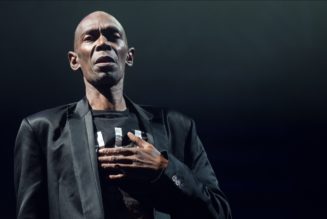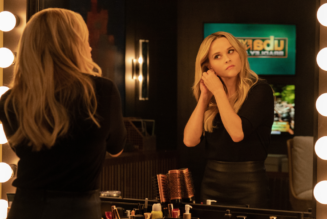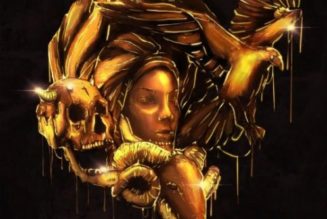
Nile Rodgers and Bernard Edwards released their first album as Chic, arguably disco’s greatest band, in 1977. In the decades since, Rodgers has charted a remarkable path as a producer and songwriter, with chart-topping songs by David Bowie, Madonna, and Diana Ross, among others.
He also continued to lead Chic after Edwards’s death in 1996, releasing the band’s comeback album It’s About Time in 2018, and extending his run of hits with Daft Punk’s 2013 smash “Get Lucky.”
Now, the busy superproducer has a hand in yet another new venture; on Monday (September 27th), Fender is launching a global campaign called Player Plus Studio Sessions, for which Rodgers will serve on a panel and judge submissions from aspiring musicians.
Related Video
Winners will be awarded with Fender instruments and 260 hours of studio time alongside professional engineers. Rodgers is a natural partner for the initiative, given that he’s been playing the same white Fender Strat, nicknamed “The Hitmaker,” for 48 years.
Shortly before Chic took the stage at O2 City Hall in Newcastle, England on September 24th, Consequence spoke with Rodgers by phone to talk about the Player Plus Studio Sessions and more. Check out the Q&A below.
You have a lot of experience breaking new artists, but what do you look for in something like this? If someone is reading this and wants to enter the contest, what qualities do you look for?
I never go into things like this with expectations — I actually like to be blown away. So if I knew what I was looking for, I would just go and search and find that. What I like is for people to sort of find me. And that’s the best way I can explain it, because I’ve known a lot of virtuosos in my life, but the virtuosos that have the ability to connect with your soul, that’s what I appreciate.
Would you say you’re looking for an original, someone who’s new?
Yes, well, someone who knows how to speak through music, not just play. And there’s a big difference, as I said, I know plenty of people with great technical facility; your jaw will drop when you hear them play. But sometimes they don’t connect with your soul, and that’s what’s really important. Music, to me — we’re messengers, we’re storytellers. And when I meet musicians who can really speak through their instruments, that’s what I hope finds me, not that I find them.
I’m sure you see the value of giving someone a chance at hundreds of hours in a real studio, even now when you can use technology to record very cheaply outside of a studio.
Yeah, and what you find is that when they get those opportunities, when they get to go to the next level, oh my God, some people just really, really flourish. It offers you more colors to paint with. As Bowie used to always say, we’re always trying to increase the colors on our palette.
You’ve worked with a lot of established artists — like Bowie — to create a new chapter of their career, but there are also people like Sister Sledge, where you helped establish them as new artists. What are some experiences you’ve had with newer artists that you’re really proud of?
I’ve been doing that all my life. In a weird way, even when I’m working with a superstar, I always think in terms of, “This is their first album.” So it’s a strange thing — even though they’re stars and they have their footprint and they’re big, [it’s like] “Let’s not go backwards, let’s go forward.”
The experience is almost always the same. We’re always searching for new territory, for new ways to touch people’s emotions, new ways to touch their souls, new ways to touch their feet. What I mean by feet is not a foot massage, but to make ‘em dance [laughs], to make them just respond to the music. When you get that primal response from a person, when an artist is able to do that, there is no greater reward.
I like the album you did with INXS, The Swing, because they were not new at that time and were already on the rise, but it seemed like you really helped them find a direction that they went in for the rest of their career.
Yeah. So here’s a great example, Sister Sledge were pretty much unknown and we made them really-well known, and INXS, the same kind of thing. But let’s take Duran Duran — they had a ton of hits when I came into their lives. I loved all of the Duran stuff before we worked together. But when I worked with Duran Duran, I really was trying to go to another place.
And I remember when I finished working with them, they said, “This is exactly where we’ve been trying to go, we just haven’t been able to figure it out.” You have no idea how wonderful that makes a composer or producer feel, when you’re able to really help an artist achieve what they instinctively know they’re trying to do, but may not have the tools or the resources to do it. And that’s what I think Fender is providing now. They’re giving people the tools and the resources to do what may be in their heart.
It also seems like you have a cool history with artists from Europe or Australia who love American music, and you help them tap into their American influences.
One can say that. I’ve had a really good success rate with people who sometimes don’t even really speak English and we come up with hit records because American music is so influential.
When did you purchase your first Fender guitar?
I bought my first Fender in 1970, and then I bought the guitar that I’m playing tonight in 1973. So I’ve been playing Fenders almost since I’ve been playing the electric guitar, which is a very long time now.
What was that first guitar in 1970?
I bought a Fender Mustang, it was all I could afford, and it was $79. And I thought it was the most incredible guitar I could ever have, until three years later, when I bought my Stratocaster that I still play to this very day. People cannot believe that I drag this thing with me all over the world. It’s the only guitar I show up with — it’s slung over my shoulder and it’s been slung over my shoulder since 1973.
I imagine that what you look for in a guitar is probably not the same thing an Eddie Van Halen-type guitarist would look for. You’re known for rhythm and texture in how you play, so what do you care about with the instruments you play?
Well, I said earlier that you want to have the ability to touch a person’s soul with your music. When I’m playing guitar, even though I know that my guitar is basically a rhythm instrument, I still use my guitar to interpret the song over and over and over again, depending on the way that I feel that particular night.
So I look at my style of guitar playing as if it’s the right hand of the piano, and that’s just how I play. I’ve never played a song the same way twice in my life, even though it sounds to you like it’s “We Are Family” or “Le Freak.” And it is, because I’m always subordinate to what I call DHM, the deep hidden meaning, or the structure of the song, so I know how to interpret it many different ways and it still just sounds like “Le Freak” or “We Are Family” or “Good Times” or “Let’s Dance” or “Like A Virgin” or whatever.
I like to interpret. I base it on the feeling and the feedback I get from the crowd every night. So what I look for in an instrument is an instrument that allows me to do that and sound a certain way, it needs to cut through the band but not dominate the band.
As a bandleader, do you encourage everyone to have the same attitude of never playing the song the same way?
We jam quite a bit, but we learn the songs technically from the ground up, and then I give my musicians the freedom to interpret and have a good time. Basically, the concept of Chic is that we were jazz musicians that learned how to play pop songs, and learned how to write pop songs. So we would be very frustrated just doing the exact same thing over and over and over again.
The whole point of playing jazz is to improvise. So we do learn the songs exactly the way that I composed them, exactly, and then they’re given the freedom to just go off.










